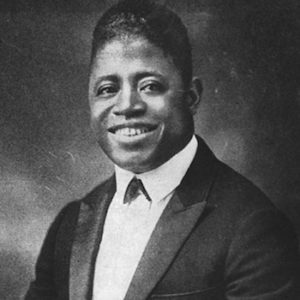
Clarence Williams
Clarence Williams was born on this date in 1898. He was a Black musician and an entrepreneur.
Williams was born on the outskirts of New Orleans, in Plaquemine, Louisiana. He was of Native American (Choctaw) and Creole heritage. His father was a bass player who made his living as a hotel owner. Williams began his musical education as a child by performing in the family hotel and singing in the streets. When he was 12, he left Louisiana for Billy Kersands's famous minstrel show as a singer, soon becoming their master of ceremonies.
Returning to New Orleans, he started a suit cleaning service and began playing piano in the honky-tonks of New Orleans's Storyville district. He also played professionally and invested much time learning new material, even writing to New York for the latest songs. During this period, he managed his cabaret and wrote his first money-making composition, "Brownskin, Who You For?" (Columbia Records).
Around 1915, he and Armand Piron started a New Orleans-based publishing company, which was in business for several years. Two years later, he and Williams put together a vaudeville act with Piron on the violin and Williams playing piano and singing. While touring, they became acquainted with W.C. Handy, who helped them place some of their compositions in Memphis music stores. An essential concert in Atlanta was moved from a Black auditorium to a white one because so many whites wanted to attend. Handy asked Williams and Piron to join him. The concert was successful, and the New Orleans duo stopped the show.
About this time, Williams claimed to be the first songwriter to use the word jazz on a piece of sheet music, and his business card began touting him as "The Originator of Jazz and Boogie Woogie.” Williams moved to Chicago in 1920, opening a music store near the Vendome Theater that proved so lucrative that he eventually owned three in the city. Williams did not confine his energies to mere proprietorship. In 1920, when the public first heard of a Black woman's voice singing the blues, they wanted more. His entrepreneurial skills enabled him to profit from this next phase in the entertainment business: selling recordings of Black female blues singers.
In 1921, Williams married blues singer Eva Taylor, one of the first female singers heard on the radio. Her performances and style influenced many future vocal stars. Williams understood the potential selling power of New Orleans music in the North. Since New York City was the center of the music publishing business, he sold his Chicago music stores in 1923 and moved there. He rented space in the Gaiety Theater Building at 1547 Broadway. This was already established as an office building for other Black entertainers, including Bert Williams, Will Vodery, Pace and Handy, and Perry Bradford. In February of that year, he and Bessie Smith went to Columbia to record her first songs. The first release featured Smith accompanied by Williams on piano Gulf Coast Blues and was composed by Williams and published by his company.
Williams accompanied Smith on many songs she recorded during that highly productive year and claimed writer's credit on such numbers as "Baby, Won't You Please Come Home" and "T'ain't Nobody's Bizness If I Do." However, Williams had a reputation for claiming credit for works he did not compose entirely on his own, and the origins of many of these songs remain in doubt. He convinced Smith that she was under contract with Columbia. She had signed a contract naming him as her manager, and he was pocketing half of her recording fee.
This episode ended when Smith and a boyfriend made a surprise trip to Williams' office, demanding that she be released from that obligation and allowed to sign directly with Columbia. On the other hand, Willie "The Lion" Smith claimed that Williams was the first New Orleans musician to influence jazz in New York and credited Williams with helping other Black songwriters like himself, James P. Johnson, and Fats Waller.
From 1923 to 1928, Williams was the artist and repertoire director for Okeh Records and organized numerous sessions that advanced the careers of many early jazz greats such as Louis Armstrong and Sidney Bechet. He employed several other jazz musicians, including Don Redman, King Oliver, and Coleman Hawkins. A shrewd businessman, Williams could arrange recording sessions, supply their material, publish their compositions, and manage their business affairs. Between 1923 and 1937, Williams proved to be a prolific producer, organizing at least two recording sessions a month and recording over 300 sides under his name.
In 1927, Williams worked in musical theater. He wrote the book and music for and produced the show "Bottomland," which starred his wife, Eva Taylor. The show was not a critical success. Yet, Williams' New York publishing company prospered, continuing to do business until 1943, when he sold its catalog of over 2,000 songs to Decca for a reputed $50,000. He lost his sight after being hit by a cab in 1956. Clarence Williams died in Queens, New York, on November 6, 1965.
A Century of Jazz by Roy Carr
Da Capo Press, New York
Copyright 1997
ISBN 0-306-80778-5
